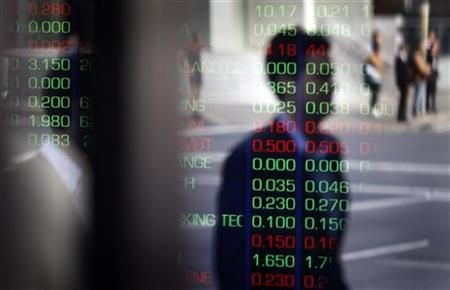Asian Shares Rise, Euro Slips Ahead of Summit

Asian stock markets rose Tuesday after Wall Street shares climbed for a third straight session, but the euro slipped ahead of talks between French and German leaders on possible further measures to contain Europe's debt crisis.
European stock markets also looked set to rise, with Britain's FTSE 100 seen up 0.2 percent and Germany's DAX called 0.3 percent higher.
But weakness in U.S. S&P futures could blunt any gains. The September contract was down 0.5 percent by 1:45 a.m. EDT.
Most in the market do not expect the meeting between French President Nicolas Sarkozy and German Chancellor Angela Merkel -- scheduled for Tuesday afternoon, or 10 a.m. EDT -- to lead to substantial progress in solving the euro zone's debt troubles.
The German government sees no major breakthrough at the Paris talks, a spokesman said Monday, while the French president's office said the creation of common euro zone bonds will not be on the agenda.
"Sovereign debt concerns remain a persistent negative for the (euro), as the EU's latest attempt at delivering a comprehensive solution to the region's vulnerabilities has disappointed investors," analysts at Standard Chartered said in a research note.
The euro slipped slightly to $1.4414, after holding just below a three-week high against the dollar earlier in the morning and after rising 1.4 percent on Monday ahead of the summit.
Traders were also awaiting German and euro zone second-quarter GDP data at 2 a.m. EDT and 5 a.m. EDT, respectively.
Japan's Nikkei was little changed, giving up earlier gains, while MSCI's index of Asia ex-Japan stocks rose 1 percent, largely as Korean shares caught up to regional gains on Monday, when Seoul markets were closed for a holiday.
EURO
Many experts say the only way to ensure affordable financing for the euro zone's most struggling, debt-laden countries would be for the bloc to issue joint eurobonds.
But even if a common euro zone bond were issued, it would not end the euro zone's debt woes at a stroke.
"There still hasn't been debate about just how much issuance would be possible and just how much issuance the German public would be okay with," said Makoto Noji, senior bond and currency strategist for SMBC Nikko Securities in Tokyo.
The dollar index against a basket of major currencies edge dup 0.2 percent.
Against the yen, the dollar traded around 76.84, down from more than 80 yen earlier in August.
EQUITIES
Asian shares drew succor on Tuesday from news that Google has offered to buy Motorola Mobility Holdings Inc for about $12.5 billion. The deal helped push up major Wall Street indexes by as much as 2.2 percent.
The MSCI Asia ex-Japan index had lost around 14 percent over the past two weeks, part of a global market rout in which billions of dollars were wiped off share indexes.
Pranay Gupta, chief investment officer Asia Pacific at ING Investment Management, said Asia's corporate sector is struggling despite the region's strong economic fundamentals, due to debt woes in the United States and Europe, and the appreciation of Asian currencies.
"The anomaly that we have today is that companies in Asia are facing a much more uphill struggle both on the sales front and on the margins front given that demand from the West is waning," he said.
He said that the ING Investors Dashboard Pan-Asia (ex-Japan) Sentiment Index, a measure of private investor confidence in the region, had dropped 11 percent in the second quarter compared to last year's third quarter.
The S&P 500 last week hit its lowest in nearly a year after the first-ever downgrade of U.S. sovereign credit ratings, but have since rebounded almost as sharply.
Gold, seen by many as a safe store of value in turbulent financial markets, is one of the best-performing assets this year. It traded at $1,765 per ounce on Tuesday, down a touch from Monday's close and around $50 off its peak.
U.S. crude oil futures slipped 58 cents to $87.30 per barrel after a $2 rise on Monday.
(Additional reporting by Masayuki Kitano, Frederik Richter and Kevin Plumberg; Editing by Kim Coghill)
© Copyright Thomson Reuters 2024. All rights reserved.




















